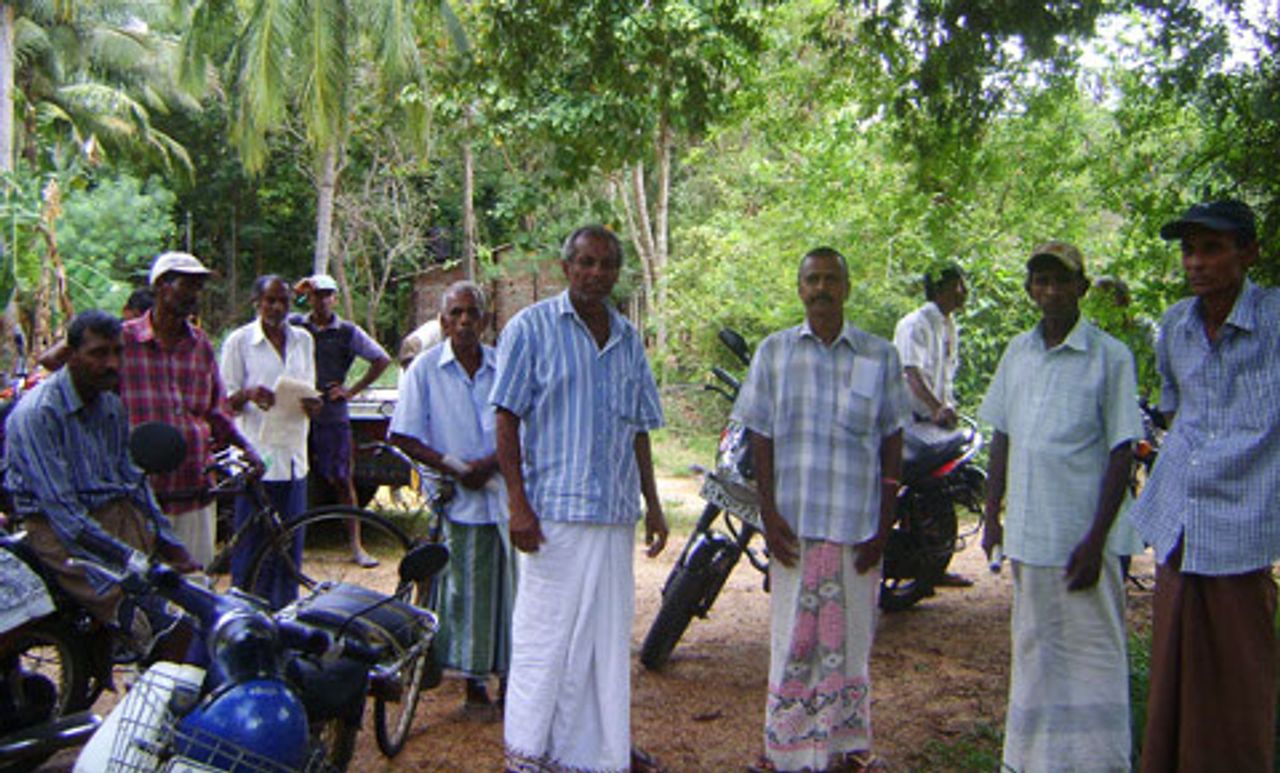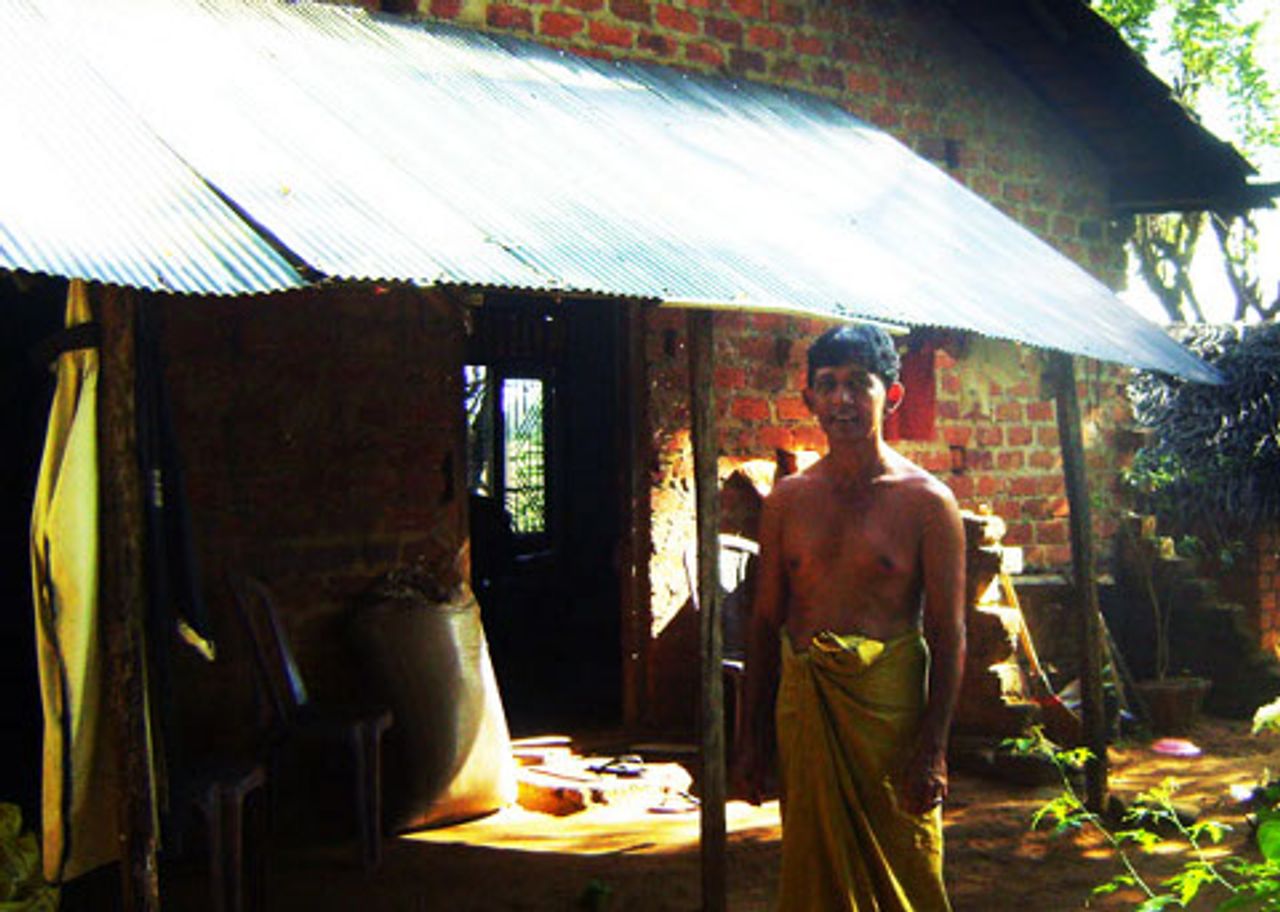Thousands of Sri Lankan rice farmers have held protests in recent weeks at Eppawala, Thambuththegama, Polonnaruwa and Hingurakgoda in the North-Central Province, Batticaloa in the east, and Dambulla in the Central Province, to demand a higher guaranteed price for their crop.
The demonstrations, which are expected to spread to other areas of the country, took place despite the government and media slandering farmers as part of a “conspiracy of wheat flour companies and anti-patriotic forces.”
The day before a farmers’ protest on March 14, Health Minister Maithripala Sirisena attempted to intimidate farmer leaders, saying they were protesting while the United Nations Human Rights Council (UNHRC) was trying to “punish the President [Mahinda Rajapakse] and the war heroes.”
 Farmers from Kaudulla C division
Farmers from Kaudulla C divisionIn recent weeks, the government has escalated its campaign against a resolution at the UNHRC calling for an investigation into human rights abuses by the military during 2009 in the final months of the war against the separatist Liberation Tigers of Tamil Eelam. Workers and the rural poor defending their living standards have been branded as unpatriotic.
Co-operative and Internal Trade Minister Johnston Fernando arrogantly rejected the farmers’ demands. He told parliament that the present rice price protected both farmers and consumers. In reality, farmers are being hit by high production costs, while the population as a whole is bearing the brunt of the government’s moves to increase prices on many essentials, in line with International Monetary Fund (IMF) directives.
World Socialist Web Site correspondents earlier this month visited Hingurakgoda, in North-Central Province, to speak to protesting farmers.
The current guaranteed price for a kilogram of paddy rice is 28-30 rupees ($US0.22), established in 2005. Since then, production costs and costs of living have skyrocketed. Production costs per kilo have increased to 29.50 rupees, according to farmers.
The government says it has allocated one billion rupees and opened its stores to purchase paddy rice. The farmers, however, complained that they still cannot sell their produce at even the inadequate guaranteed price, despite the government’s propaganda. The estimated paddy harvest for this season is 4.5 million tonnes, but only 10 percent of the total is to be bought by the government. The rest has to be sold to private traders, who pay about 16-18 rupees per kilo.
A farmer from Kaudulla-C area told the WSWS: “Every harvesting season we face this problem. The government buys only 500 kilos of paddy rice per acre of farm. That is also buying only under government’s standards. The moisture content must be lower than 14 percent, and there should not be black seeds. Even if we satisfy those conditions, we face other difficulties. After all that, you have to wait more than a week to receive a cheque for the sale.”
Farmers angrily rejected the claim made by Co-operative Minister Fernando that the production cost of a kilogram of paddy rice is 12 rupees. The government has cut the amount of subsidised fertiliser provided per acre by 10 kilograms on the pretext of encouraging farmers to use their own compost instead.
U.B. Jayasekera, 40, explained his bitter experiences with farming. “I studied up to Advanced Level [in school]. As there was no other job, I had to choose farming. But you cannot earn enough to live from farming. You need 45,000-50,000 rupees to cultivate an acre. The maximum harvest does not exceed 2,500 kilos. Even under the guaranteed price you will get 70,000 or 75,000, so you only get 20,000 or 25,000 rupees profit. That is for six months, including food expenses and everything else. I am cultivating only 2.5 acres. Is it enough to manage under the present cost of living?”
Lack of land, indebtedness, poverty and unemployment are rampant among farming families. The original land was often granted as part of the government’s policy of settling impoverished Sinhala farmers in predominantly Tamil areas. This land has been divided in subsequent generations and many family plots are now 1.5 acres or less.
 R.B Dharmathilaka outside his half-built home
R.B Dharmathilaka outside his half-built homeR.B. Dharmathilaka is a young farmer. He inherited the land from his grandfather. “During the war time I was offered land from Padaviya in Anuradhapura district. Those lands were distributed as part of establishing ‘border villages’ against the LTTE. I didn’t go, as it would have been to die in vain. With difficulty, I maintain three cows for milk. It is just enough to live on.”
Premarathne Bandara and his brothers have no paddy fields. They farm rented property. They have to pay 630 kilos of paddy rice per acre as rent for a season. Premarathne had to stop studying due to economic difficulties. “As there was no other alternative, I was compelled to farm on rented land to feed my family with at least rice and coconut sambol,” he explained.
The family had to take loans from banks and private money lenders, mortgaging everything from jewelry to electric goods, tractors, bicycles and motorcycles. To get a loan from a state bank they need at least a 50,000-rupee fixed deposit account, or they have to mortgage their land deed.
The private sector enjoys a monopoly on every aspect of rice farming, from the sale of paddy seed to agricultural machinery. Increasingly, agribusiness is playing a more significant role. More than 2,000 acres of the state-owned Vincent Park farm in Hingurakgoda has been sold to CIC, a major agricultural company.
There is widespread anger among the farmers, directed not only toward the government but the political establishment as a whole. One farmer explained: “We voted for this government in the last elections. But now we have been disappointed. The UNP [opposition United National Party] was in the office before and the JVP [Janatha Vimukthi Peramuna] was in [ex-president] Madame Chandrika Kumaratunga’s government. Those two parties also did the same thing, didn’t they? We were cheated by all those parties. We have no idea about voting for anyone in future.”
The All Ceylon Farmers Association, a JVP organisation, organised protests in some areas and JVP parliamentarians addressed farmers. They simply the illusion, however, that protests and pressure would force the government to increase the guaranteed price.
The Rajapakse administration has established a “fact finding committee” of government ministers and secretaries to examine whether there should be an increase. The committee, which will report to Finance Secretary P.B. Jayasundara, is aimed at defusing the farmers’ protests and will do nothing to resolve the crisis in rural areas.
The price of rice has already been determined in advance by the agenda laid down by the IMF. The fight for decent living standards for the rural poor involves a political struggle not only against the Rajapakse government but also the profit system it defends. Only a workers’ and peasants’ government based on socialist policies can address the problems facing the rural masses.
